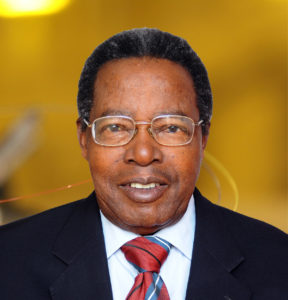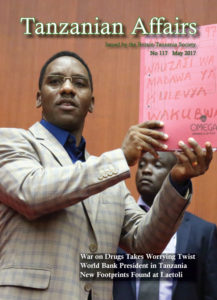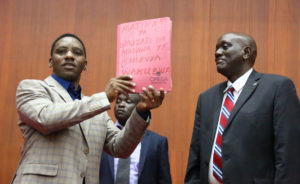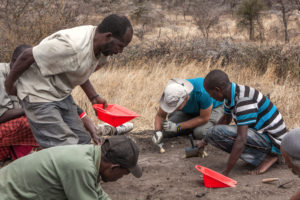by Ben Taylor
Ambassador Clement George Kahama
After a period of deteriorating health Ambassador Clement George Kahama, popularly known as “Sir George”, died in Dar es Salaam on 12 March 2017, aged 88. His long political career – first in local government and then at the national and international levels, and covering both the colonial and independence eras – spanned more than half a century. He was the longest serving Minister in Tanzania’s history, holding a wide range of portfolios.
Born in November 1929 in Karagwe (Kagera Region), Sir George was educated at the Ihungu Secondary School and then the Tabora Government Boys Upper Secondary School, prior to undertaking his higher education at Loughborough College in UK between 1952 and 1954. He then returned to Tanganyika to become the First General Manager of the Bukoba Native Cooperative Union Ltd (responsible for the purchase, processing and marketing of coffee, tea and other agricultural commoditie
s) and also to serve concurrently as Chairman of Bukoba District Council.
In 1957, he became a Nominated Member of the Tanganyika Legislative Council (LEGCO), representing the then West Lake province (now Kagera Region) and from 1958 was an elected MP for that Region. In the two years leading up to Independence he served as Minister for Social and Co-Operative Development in the transitional government.
In the three years immediately following Independence on 9 December 1961, Sir George served first as Minister for Home Affairs and then as Minister for Commerce and Industry, Communications, Transport and Works. He then began the first of three career stints overseas, serving in 1965 and 1966 as Tanzania’s Ambassador to the Federal Republic of Germany and to the European Economic Community.
He returned to Dar es Salaam to become for the next seven years the General Manager and CEO of the National Development Corporation, the largest holding company in Tanzania. It was the period immediately after the Arusha Declaration and, during his stewardship, 89 industrial, agricultural, mining and commercial parastatal enterprises were established (some of them as joint ventures with transnational corporations).
Then for the ten years after 1973 George Kahama had responsibility for the planning, development and building of the new national capital, Dodoma. He discharged these responsibilities concurrently as both Minister of State in the President’s Office and as Director-General of the Capital Development Authority. They were challenging times but today Tanzania’s functioning new capital city stands as a testament to Sir George’s determination to realise Mwalimu Nyerere’s vision.
Next, serving as Minister for Natural Resources and Tourism in 1983 and 1984, George Kahama turned his attention to developing and promoting the spectacular game reserves and national parks for which Tanzania is famed worldwide. Then, for the succeeding five years he served as Tanzania’s Ambassador Extraordinary and Plenipotentiary to the People’s Republic of China, with concurrent accreditation to Vietnam, North Korea, Hong Kong and Thailand.
From Beijing he moved to Harare, serving next as the Tanzanian High Commissioner to Zimbabwe in 1989 and 1990.
Then, as the domestic economic reform programmes took root and the Tanzanian government made moves to liberalise the economy and to welcome private and foreign investment, Sir George was recalled to Dar es Salaam in 1990 to establish and run the Tanzanian Investment Promotion Centre (now TIC). He was the Centre’s First Director-General, in the President’s Office.
Between 1995 and 2000 Sir George continued in Parliament as the MP for Karagwe. George Kahama’s last Cabinet portfolio was as Minister for Cooperatives and Marketing, a post he held for five years until his retirement from active politics in November 2005.
Sir George served each of Tanzania’s first three Presidents (Nyerere, Mwinyi and Mkapa). He was a man of many accomplishments, discharging each of his responsibilities with an almost boundless energy. Few people, even those in high office, are as fortunate as he to have such opportunities to lay the foundations for the development of a major new nation like Tanzania. Moreover, as a devoted Catholic, Sir George was honoured with two special Presidential assignments. In 1962, he represented President Nyerere at the inaugural meeting of the Second Ecumenical Council in the Vatican, returning to Rome in 2005 to represent President Mkapa at the funeral of Pope John Paul II.
Many in the older generation of Tanzanians remember George Kahama with fondness. In retirement he was Chairman of a number of private Tanzanian companies. He lived with his family in Msasani and is survived by his wife Janet and eight children. After lying-in-State at the Julius Nyerere Convention Centre, followed by a memorial service on 16 March at St Peter’s Oysterbay – a service attended by many government and CCM leaders both past and present as well as by other dignitaries – Sir George was laid to rest in Kinondoni Cemetery.
I had the privilege of working with Sir George in a Commonwealth advisory capacity in the early 1990s when he was heading the Tanzanian Investment Promotion Centre, and I came to know him and some of his family well. I am especially grateful to his eldest surviving son, Richard Kahama, for having provided his Father’s detailed CV and for his approval of this Obituary. Roger M Nellist with special thanks to Richard Kahama
Philemon Ndesamburo
The death of Philemon Ndesamburo; business tycoon, Chama cha Demokrasia na Maendeleo (Chadema) co-founder, and former MP, brought the town of Moshi to a standstill as thousands suspended their activities. Current Chadema National Chairman Freeman Mbowe led procession carting the casket through the town. Permission for the procession had initially been denied by the police, but the decision was reversed following a public outcry, though the planned route and destination were altered.
Born on February 19, 1935 in Old Moshi ward, Moshi District in Kilimanjaro Region, went on to become a successful businessman, generous philanthropist and seasoned politician. He was fondly referred by many as Mzee Ndesa while others, due to his sound financial situation, added, Mzee Ndesa Pesa.
With a degree in Agricultural Business from the University of London, UK, in the 1970s he was reportedly posted to a position he considered not conforming to what he studied. Instead, he opted for life out of the government system.
He first ventured openly in politics in pursuit of reforms in 1988 as one of a small group advocating for changes to the national constitution. With the advent of multi-party democracy, he was among the first ten members of Chadema. He lost two hard-fought electoral campaigns against Augustino Mrema, in 1994 for Councillor of Kiboriloni Ward in Moshi and in 1995 for Moshi Urban parliamentary seat, before eventually winning the same seat in the 2000 elections. He held the seat until his retirement in 2015.
But his influence within Chadema extended well beyond his own electoral career. Ndesamburo earned a position for himself as the kingmaker and the financier of last resort to opposition politicians, particularly in northern regions. He also served as Central Committee (CC) member, Kilimanjaro regional chairman, and a member of the Chadema Board of Trustees.
As an opposition politician, Ndesamburo preferred to tell the government what it should do in a persuasive manner rather than adopting the brash and confrontational style of many opposition politicians. Just a week before his death, he discussed President John Magufuli’s industrialisation drive, arguing that it would not attain the desired results if it was not linked to agriculture, which remains the backbone of Tanzania’s economy. “The two sectors have to complement each other for the economic take off desired,” he said in an interview.
Chadema Co-Founder and first Chairman Edwin Mtei, a senior official in the first phase government, attributed the success of the party to the late Ndesamburo. Mr Mtei who was. “We knew each other since our childhood; we rented and later built houses at nearby areas in Dar es Salaam. We collaborated for a long time since we were at Old Moshi Mahoma and later in the party. We initiated it as an empty set and now it is the main opposition party. … It is his courage and ability that got us here,” said Mr Mtei.
Brian Harris
Born in Neath, South Wales, in 1929, Brian Harris went to the Neath Grammar School for Boys and then to Aberystwyth University, where he studied agricultural botany and became an expert plant scientist. Later he undertook a PhD. He shared interests in natural history with his wife Sine MacLachlainn, from Mull, who was also a botanist. Brian was eventually appointed to teaching posts with his wife. Together they worked in several African universities including in Ghana, Nigeria and the University of Dar es Salaam, where Brian was Head of Botany.
Brian brought many positive, new ideas to the University of Dar es Salaam: he saw the need for a herbarium and saw to it that the herbarium had a staff, and was himself interested in the campus grounds. He was also a great naturalist and ecologist, including work on bat pollination in African plants.
Following his retirement in 1990, Brian relocated to Edinburgh. But his love of plants and flowers continued as he threw himself into a variety of community projects in the city.
Recently he had suffered from cancer of the larynx, from which he was recovering, but sadly he died after a short illness on 20th April 2017.
With thanks to Heather Goodare of the Friends of the Meadows and Bruntsfield Links (FOMBL) in Edinburgh, and to Kim Howell.




